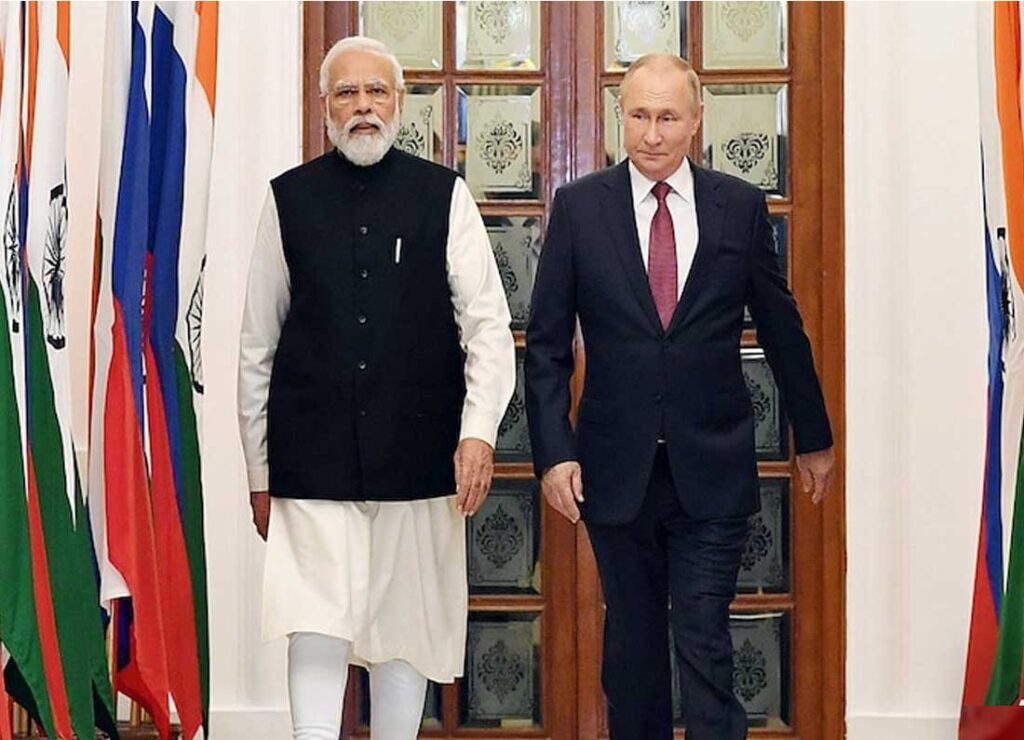Vladimir Putin’s Upcoming Visit to India: An Era of Renewed Partnerships Russian President Vladimir Putin is set to visit India in the coming weeks, with dates currently being finalized by the Kremlin. This much-anticipated diplomatic engagement is expected to reinforce the longstanding strategic partnership between the two nations
Russian President Vladimir Putin is set to visit India in the coming weeks, with dates currently being finalized by the Kremlin. This much-anticipated diplomatic engagement is expected to reinforce the longstanding strategic partnership between the two nations. As global powers navigate a landscape marked by shifting alliances, economic challenges, and regional security threats, the visit signifies a critical step in reaffirming the India-Russia relationship.
Historical Foundation of India-Russia Relations
The relationship between India and Russia is steeped in decades of cooperation that began during the Cold War. From defense collaborations to mutual support in international forums, the partnership has stood the test of time. India’s balanced foreign policy and Russia’s consistent support for India’s sovereignty, including on sensitive issues like Jammu and Kashmir, have formed the bedrock of this relationship.
In recent years, despite challenges such as the Ukraine conflict and global sanctions against Russia, the partnership has evolved. India has maintained a neutral stance, emphasizing dialogue and peace, while continuing its trade and energy ties with Moscow. This pragmatic approach has allowed both countries to benefit from a multifaceted engagement.
Strategic Goals of the Visit
Putin’s visit to India carries immense strategic weight, addressing several critical areas of collaboration:
1. Defense and Security
India has been one of Russia’s largest defense partners, with over 60% of India’s military hardware sourced from Russian manufacturers. Key focus areas during the visit may include:
- Indigenous Production: Discussions on expanding joint ventures for local manufacturing of advanced weaponry under the “Make in India” initiative.
- Advanced Technology: Potential deals for fighter jets, submarines, and missile systems such as the S-500 could strengthen India’s military arsenal.
- Counter-Terrorism: Collaborative efforts to combat global and regional terrorism will likely feature in discussions.
2. Energy Cooperation
Energy security remains a cornerstone of India-Russia ties. As one of the world’s largest energy importers, India seeks stable and diversified supply chains:
- Oil and Gas Deals: Talks may include long-term agreements for increased oil and LNG imports from Russia, ensuring competitive pricing.
- Nuclear Energy: Expansion of nuclear power projects, such as the Kudankulam plant in Tamil Nadu, could see fresh commitments.
- Renewables Collaboration: With India’s push toward clean energy, joint ventures in solar and hydrogen technologies may emerge.
3. Trade and Economic Ties
The current annual trade between India and Russia stands at approximately $35 billion, with an ambitious target of $50 billion by 2025. Expected developments include:
- Boosting Bilateral Trade: Enhanced exports of pharmaceuticals, IT services, and agricultural products from India to Russia.
- Payment Mechanisms: Streamlining rupee-ruble trade mechanisms to bypass sanctions and facilitate seamless transactions.
- Industrial Collaborations: Partnerships in mining, manufacturing, and technology.
4. Space and Technology
India and Russia share a history of collaboration in space exploration. Areas of interest include:
- Space Missions: Joint initiatives for satellite launches and space research could see renewed commitments.
- Artificial Intelligence and Cybersecurity: Partnerships in emerging technologies are likely to gain momentum.
5. Geopolitical and Regional Security
Amid the Russia-Ukraine conflict and evolving global dynamics, geopolitical dialogue will dominate the agenda. Key topics include:
- Ukraine Crisis: India’s mediating role in fostering dialogue between Russia and the West.
- Indo-Pacific Security: Cooperation to counterbalance growing influence from other global powers in the region.
- BRICS and SCO: Strengthening multilateral platforms where both countries play pivotal roles.
Challenges and Opportunities
While the visit promises to deepen ties, certain challenges remain. These include:
- Global Sanctions: Western sanctions on Russia could impact trade and investment.
- China Factor: Russia’s growing closeness to China may raise concerns about the balance of power in Asia.
- Energy Dependence: India’s reliance on Russian energy must be balanced with its commitments to renewable energy transitions.
Opportunities, however, far outweigh the challenges. With robust bilateral mechanisms and shared strategic interests, the visit offers immense potential for progress.
Implications for Global Diplomacy
Putin’s visit comes at a critical juncture in international relations. It signals Russia’s intent to diversify partnerships amid growing isolation from the West. For India, it underscores the importance of maintaining balanced relationships with major global powers.
Economic and Strategic Benefits for India
For India, the visit is expected to yield several tangible benefits:
- Enhanced Defense Capabilities: Access to advanced technologies and weapon systems.
- Energy Security: Stable energy supplies at competitive prices.
- Economic Growth: Increased trade volumes and new investment opportunities.
- Geopolitical Influence: Strengthened position as a mediator and global leader.
A Milestone in Bilateral Relations
Vladimir Putin’s visit to India is poised to be a landmark event, underscoring the resilience and adaptability of India-Russia ties. By addressing pressing challenges and exploring new avenues of collaboration, the visit promises to reinforce a partnership that has stood the test of time.

